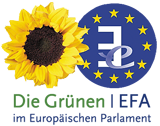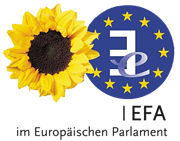Green lawmaker Rebecca Harms has supported the pro-Europe protesters in Ukraine from the start. She tells DW that she senses a real desire for democratic change and closer ties with Europe.
Rebecca Harms, you were one of the main European representatives during the protests in Ukraine. You were also one of the first to attend the mass rallies in Kyiv. What is your impression of the situation there?
I've known Ukraine for a very long time and have seen the many ups and downs. The strong reaction and the huge mass protests against Yanukovych's decision to leave the European way - it showed that this country and this nation definitely has decided which direction the people want to take. I'm convinced that even if the Euromaidan is in a pending situation - without a clear strategy about how to continue - this protest and this refusal to follow Yanukovych will last.
I think Ukrainians in the majority are no longer ready to accept this kind of policy they got from Yanukovych and his predecessors. They want the rule of law. They want to vote every four or five years. They want a state, a president and a parliament they can rely on. And they want politicians who work for the citizens and not just for their own interests. Never before have I had the impression that a new generation in Ukraine is ready to take over. But now on the Maidan I had exactly that impression.
Speaking of a generation that's possibly ready to take over. You've met Mr Klitschko on several occasions. What was your message to him?
I had met him several times already. Since the last elections, he has been the leader of one of the parliamentary groups, the Liberal group, or so-called Liberal group, in the Ukrainian parliament. He has one advantage compared to his colleagues in the opposition. He doesn't have any roots in the past - especially not in the times when in the privatization waves, many politicians took something from what was owned before by the state. I wish him good luck. He is a very nice and very skilled politician. What he is still missing is a functioning political party and a program. If he had this, he would be the clear alternative to everybody.
There's one problem for Mr Klitschko. He doesn't have the right to be a candidate for the next presidential elections based on the Ukrainian constitution. That can be only somebody who has lived in the country for at least 10 years. And as far as everybody tells me Mr Klitschko doesn't fulfil this requirement.
We're at the council building where the European summit is under way. Ukraine will also be discussed. What are your hopes? Do you expect a crucial message to come out of this summit towards Ukraine?
Since Yanukovych decided to sign some economic agreements that can help the country right now - especially on gas prices - it seems as though the battle is over. But that's not true. And it's not what the people, the citizens on the Euromaidan think.
They see that it's not the customs union which has been signed. That means for the European Union that the door for the association agreement must really be open. And the EU must give clear signals that we're also ready to support the country in these difficult times. An important signal would be to rethink our energy strategy when it comes to Ukraine. The best assistance that could come from Europe is to make the gas pipelines functioning for the transport of gas both ways. And then, very soon, we need an action plan for Ukraine on energy efficiency and its own reasonable energy strategy for the country.
Are any of these measures likely to be discussed at the summit?
I hear there are signals against South Stream coming from Europe. That's a very important signal because if Europe finds this South Stream pipeline in breach with European rules, then it helps Ukraine to have the guarantee that the pipelines in Ukraine are still necessary.
Then there's something that the European leaders could decide easily which would be a very important signal for Ukrainians, especially for those who have been taking to the streets for years, we need better traveling possibilities for the people in Ukraine. I would recommend that we would have either a visa free regime for a limited period or to go for very cheap visas for Ukrainians and to offer and facilitate the visa requests, all over the country, decentralized in the many consulates by the European Union that we have and to facilitate the visa not only in Kyiv.
European leaders are also discussing defense policy at this summit. Will we see major breakthroughs at this summit? France is calling for its European partners to supply more money for its missions in Africa. Do you think that's likely to happen?
We need an evaluation of what we've done in terms of security strategies or interventions over the last couple of years. What was the result of such interventions? Not only in the south of the Mediterranean, where different European troops have been active and where we've always had difficulties to have common strategies. I think we should also rethink Afghanistan, and which conclusions we have to draw. We're more or less fleeing the country.
What does that mean for a future common concept for security and defense?
If you start like this then there might be an idea what a common defense and security strategy would look like and what our common ideas are. But what's happening here is completely different. A very weak European budget is now supposed to fulfil wishes like the desire to have drones, like those wishes coming from France regarding their intervention in Mali. That's far from being a strategy. In addition, they even want to use the research funds and civil research programs for security and defense research. That's a scandal. Before we have a better budget - also for social purposes - I'm far away from agreeing with this.
Speaking about the topic that dominated the headlines on Wednesday and Thursday - the banking union. Would you agree that it is a major breakthrough?
It is a major breakthrough that the ministers agreed that we need the single resolution mechanism. The problems like always in the European Union start after what has been decided and presented. It makes a big difference whether the board that will judge how this bank will be resolved - whether in this board the member states are dominant or whether this is a true European body and member states are marginalized. If member states are dominant on the board then the danger is very high that they will protect important banks from their countries and stop the ideas to resolve those banks.
You're saying that the danger is that decisions will lose objectivity after Germany has pushed through its demand that the last say stays with the council of finance ministers rather than passing power on to bodies in Europe?
I think the resolution of banks is a true European interest, after we've seen how those internationally active banks can endanger whole member states. I think the interest behind the single resolution mechanism is a common interest and not the interest of one single member state. The power of the member states should be limited and the common European view should be the decisive one.
Rebecca Harms is a member of the Green Party in Germany and the deputy president of the Green group in the European Parliament. She has frequently attended mass rallies organized by the political opposition in Ukraine since the country's President, Viktor Yanukovych, decided not to sign a long-planned association agreement with the European Union.

